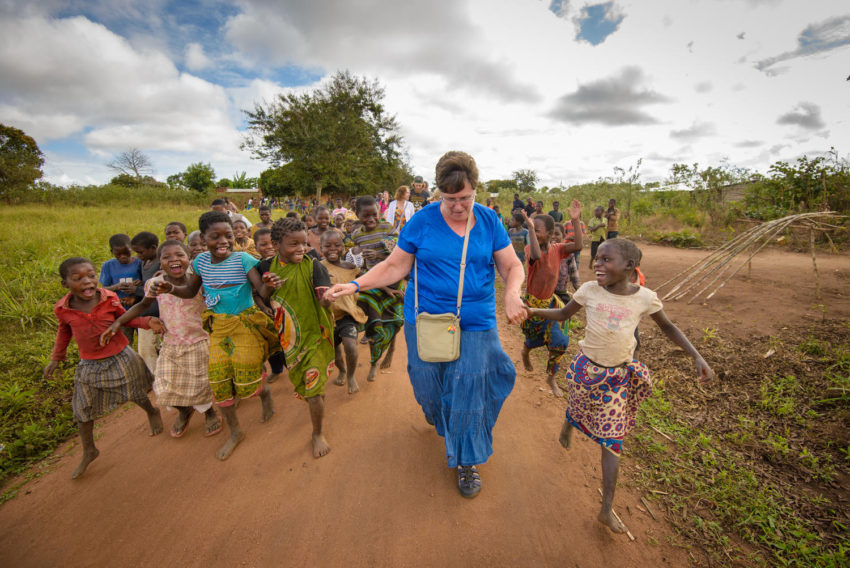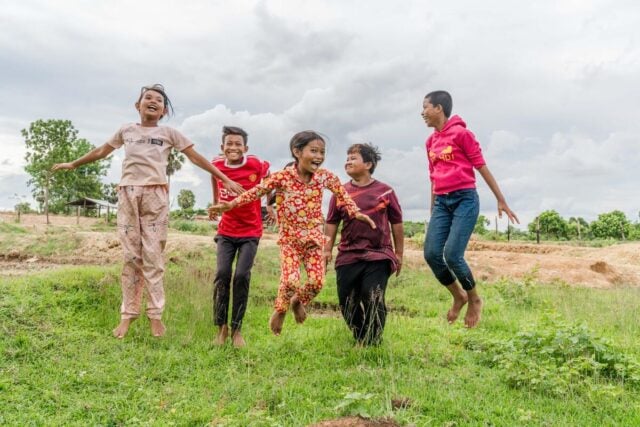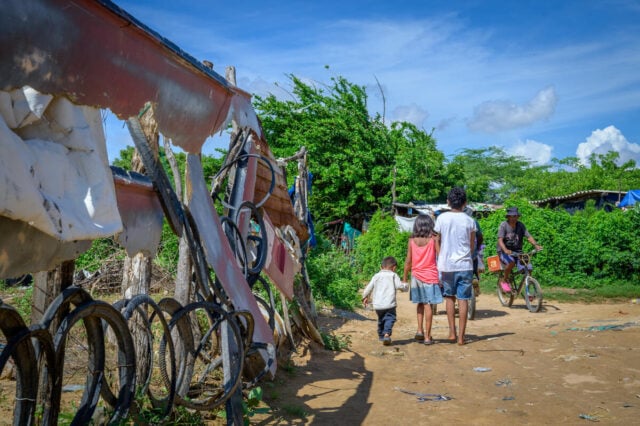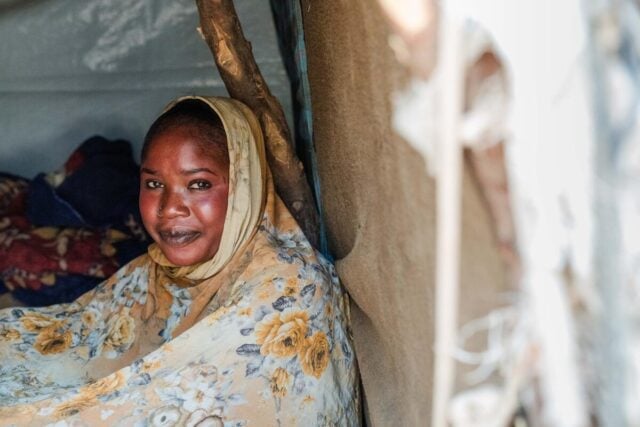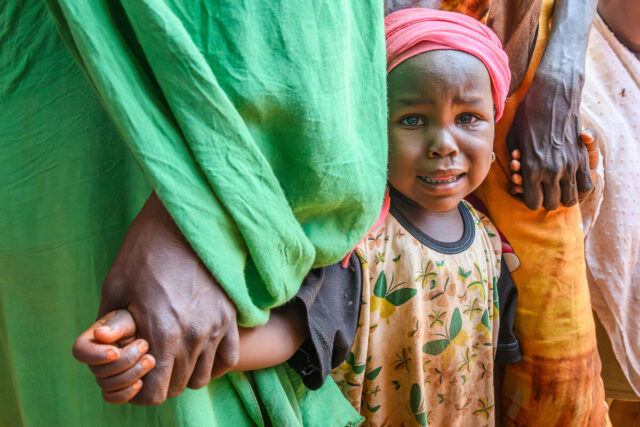The rutted red dirt road made for a bumpy ride to the village, but no one seemed to care. The SUV bounced over potholes and skidded along the rain-saturated roadway lined with trees, shrubs, and the occasional plot of corn.
The group from Eagle Brook Church in Minnesota had traveled a long way that February morning in 2007 to attend a worship service in southern Mozambique. When they arrived at the church, about 100 people welcomed them, seating the visitors in the front row as rain cascaded through the roof’s numerous holes. Suffocating, 90-degree heat engulfed the partially enclosed structure.
An hour into the service, a woman stepped up to read Scripture. Until then, Eagle Brook member Duane Vik had struggled to follow the service, conducted in Portuguese. But when the woman began to speak, the message became crystal clear. He knew in his heart he was listening to Psalm 8, which praises God’s majesty.
Duane felt a bond with the other worshipers and deep gratitude to “be able to share a common faith with people from a completely different culture.”
The trip convinced Duane and the others that Mozambique is where they needed to serve, with World Vision as their partner. “Eagle Brookers love it when we can make a monster impact,” says Executive Pastor Scott Anderson. And in seven years, they have sponsored 3,400 children, supported thousands of pastors, drilled nearly 200 wells, and built dozens of schools. Once a congregation focused inwardly and locally, Eagle Brook now pours itself out in global missions.
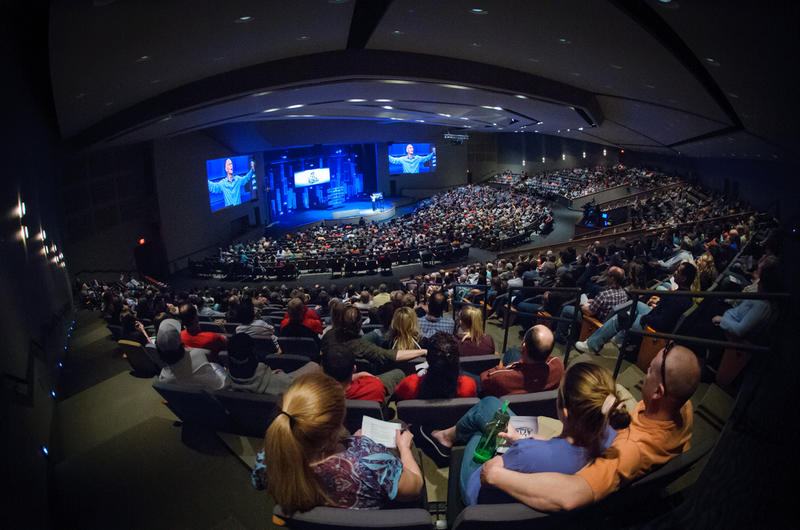
Convicted by a rock star
Eagle Brook Church, which began humbly in 1948 with a handful of members, is today a 20,000-member congregation across six campuses in the Minneapolis suburbs. It ranks 16th on Outreach magazine’s list of fastest-growing U.S. churches.
Senior Pastor Bob Merritt, who has shepherded the flock since 1991, says there was an enormous need to reach people for Christ in the Twin Cities, so Eagle Brook focused there in its first few decades. He would tell people who pushed for international ministries, “There will be a day when we can harness this growth, to do missions in a way that has an impact globally.”
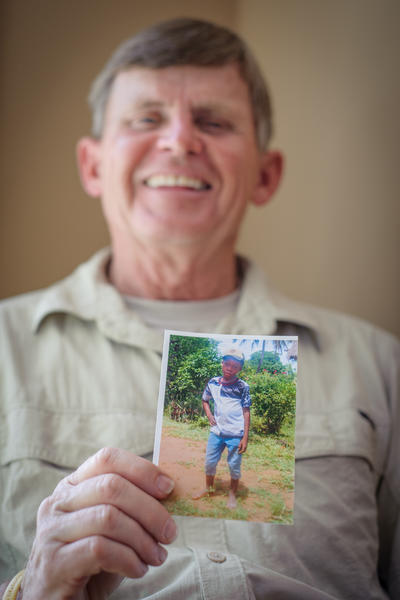
That day came in 2006, during the Willow Creek Global Leadership Summit. U2 lead singer Bono delivered a hard-hitting challenge to the western church: Step up to the AIDS crisis and lead the way in emulating Jesus’ heart for the poor around the world.
Bob immediately huddled with members of his leadership team and asked, “Are you feeling the same thing I am?”
They were. “It knocked us right between the eyeballs,” says Dale Peterson, executive director of the Eagle Brook Association. Unanimously the leadership team agreed that this was the nudge they needed.
But where and how? “We knew we weren’t the ones to create a ministry someplace,” says Dale. Looking for a credible, experienced partner, they did research and found World Vision. At the next board meeting, the team floated the idea of an initial $250,000 gift. “I think it was Duane Vik who literally pushed [the paper] back and said, ‘That’s not nearly enough. We need to double or triple that,’” Dale remembers.
There will be a day when we can harness this growth, to do missions in a way that has an impact globally.—Bob Merritt, Eagle Brook Senior Pastor
A year after Bono’s wake-up call, Dale, Duane, and others were in southern Africa, getting a feel for World Vision’s work in communities. They’d wanted to minister in an underserved place, and Mozambique fit the bill: Even today, life expectancy is only 50 years, less than half the people have access to safe water, and 70% of the population lives under the poverty line.
The Eagle Brook team was impressed by World Vision’s community-based model that aims for sustainability. They saw people beginning to thrive because of a well that brought clean drinking water and farming families equipped to cultivate more crops and run better businesses. “We love the fact that the plan is, in 15 years or so, to be out,” Dale says. “So it’s not just this prolonged dependency on America.”
That first trip they realized they could have a deep impact on the entire country.
God’s mission unfolds
During 13 years of Marxist rule, Mozambique’s government banned Christianity and other religions. The nation adopted a new constitution in 1990, and Christians once again were free to express their faith. But many pastors still lack training and essentials — even Bibles.
Caring for these struggling pastors and their congregations was a high priority for Eagle Brook. The church’s funding for World Vision’s Christian witness programs has had a wide impact across Mozambique, providing training for thousands of pastors, as well as more than 900 Bibles and 15,000 pieces of Christian literature. In addition, thousands more benefited from spiritual nurture activities, prayer, and leadership seminars, including local children, youth, and World Vision local staff.
When Pastor Jornito Jorge steps in front of his congregation at Luz de Jesus, or Light of Christ, church in Impareia, it looks a little different than Bob Merritt’s setup — there are no giant video screens or state-of-the-art audio and lighting systems, no stadium seating for 2,000. The mud-brick structure with thatched roof and mud bench seats holds a few dozen people. But Jornito has a Bible from which to preach — and new confidence.
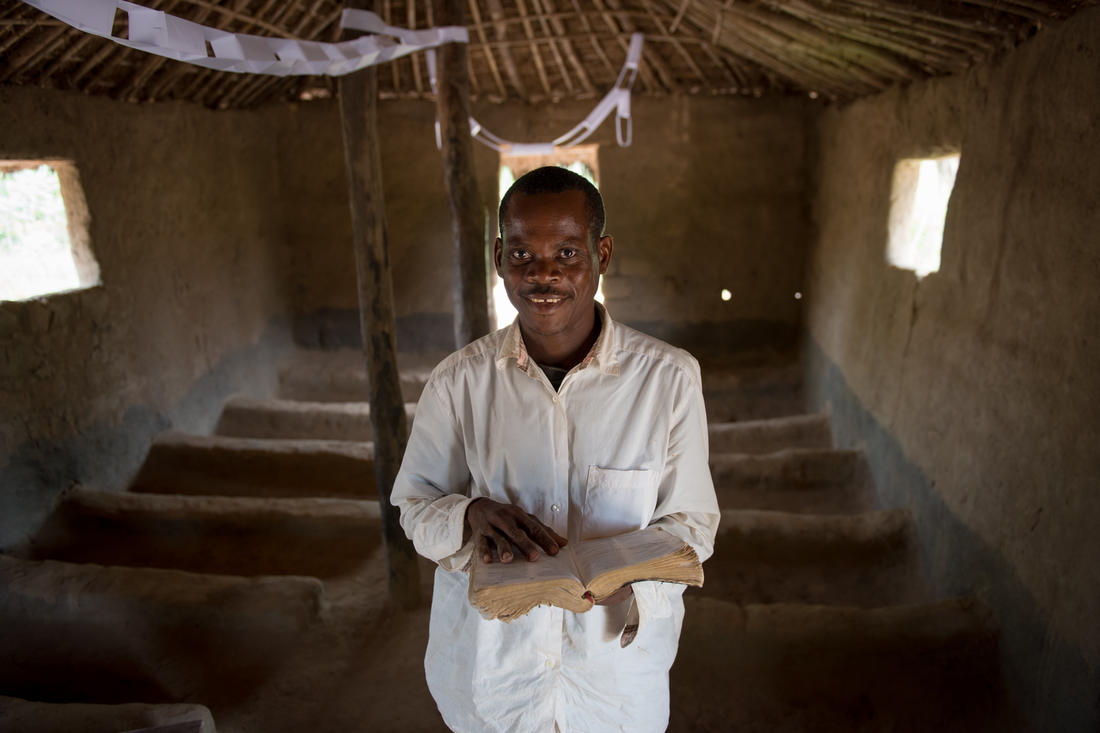
Jornito, a pastor since 2002, completed training in leadership, spiritual maturity, family issues, and Sunday school teaching. The support brought him closer to other local pastors. “If you have interaction with other churches, you grow spiritually and you learn to know much better the Word of God,” he says.
He also guides Sunday school teachers to focus on children and help them know God.
World Vision equipped Jornito to meet the material needs of his flock as well. He heard about a volunteer program called Community Care Coalition that enables churches to create a support network around vulnerable children, especially those affected by AIDS. He asked World Vision to help him start a group in his church, which now cares for 144 children. Volunteers routinely set out on foot or bicycle to check on vulnerable families, making sure they get the help they need.
If you have interaction with other churches, you grow spiritually and you learn to know much better the Word of God.—Pastor Jornito Jorge
Light of Christ’s coalition sprang into action when they discovered 12-year-old Adelina and her grandmother, Juliet, living in a grass-roofed shelter without walls — all Juliet could manage after their house collapsed. The widow and her orphaned granddaughter suffered when it rained and feared harm from snakes and strangers.
Church volunteers made bricks and brought supplies to build them a sturdy home. Adelina praised the workers as “good people,” but Juliet saw the deeper connection. “God is powerful,” she says, “because he saw that we have been through a difficult situation, and now we have this new house.”
Thousands of children sponsored
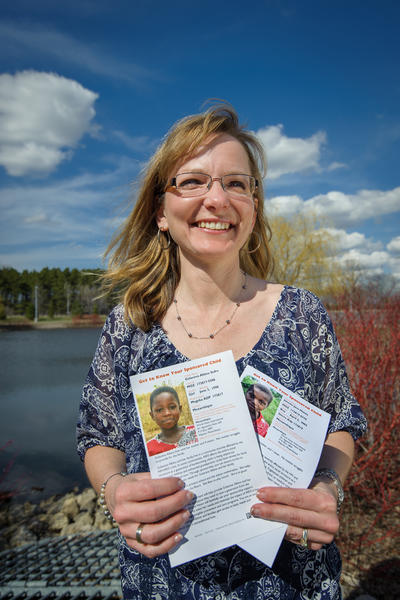
Another key connection is between a child in Mozambique and an Eagle Brook sponsor — multiplied 3,400 times. Whenever the church presents the sponsorship opportunity, made real by the testimony of mission teams, the response is immediate and strong.
At one of the sponsorship weekends she organized, Aimee Roddel set up a table laden with child picture folders directly across from the sanctuary. “People just made a beeline to the table in tears,” she recalls. “Families would say to me, ‘I have everything, and they have nothing.’ I was so blessed to witness those life-changing experiences with people.”
Every Eagle Brook sponsor has a story about how the connection with children in Mozambique provoked a shift in priorities. Dale Peterson admits he has a tough time pronouncing his sponsored child’s name, so Dale calls him “Ace.” During a visit with the boy, Dale explained that “Ace” means number one. “We made a family decision that — given the greater awareness of Ace, and we have two other kids we sponsor in Mozambique — we’re going to spend less on each other and do other things for people who really need help,” Dale says.
Colleen Wilcek and her husband, Don, are entering their retirement years, but there’s no chance they will discontinue supporting their four sponsored children in Mozambique. Like Dale, Colleen has traveled to meet the children, which not only opened her eyes to their realities but also taught her about unconditional giving. “One of my kids, the poorest of them I could tell, brought me a big container of bananas,” she says. “You could tell they didn’t have the proper clothing, the proper nutrition, but they were willing to give me not a banana, but a whole bucket of bananas.”
We made a family decision that … we’re going to spend less on each other, and do other things for people who really need help.—Dale Peterson
With another sponsored child, Dercia, “We just connected,” Colleen says. “There was no hesitation on her part and certainly not on mine. That only happens when Christ is involved in the situation. We were family. No doubt.”
Dercia, now 13, holds on to that memory. “It was a very special time. We talked a lot,” she remembers. This is a girl who needs more happy days. Her father died when he suffered an epileptic seizure while bathing in the river, the only water source at the time. Her mother was left alone to care for nine children and seven grandchildren living in the same house.
The river that stole her father was the same place she trekked with her sister at 4 a.m. to collect water. Dercia was afraid of the darkness and shivered in the cold during the winter months. The school she attended was made of stalks covered by grass, which let in the rain. The students had to sit on the ground, dirtying their clothes and books.
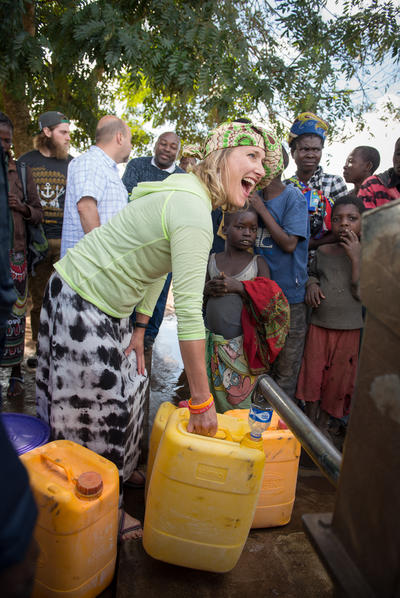
But today, thanks to Colleen and other Eagle Brook sponsors, borehole wells provide clean water for Dercia’s community. World Vision improved the school, so now Dercia sits comfortably at a desk. After meeting Colleen, she says, she began to study with more enthusiasm because she knew someone was encouraging her and following her progress.
The power of sponsorship is that not only one little girl benefits. Sponsorship funds help provide schools that make education available to all children, increasing hope that the young people will change their circumstances. Dercia says, “With this school, my colleagues also will study and help to end poverty.”
Impact outside the walls
An Eagle Brook delegation went back to Mozambique for the sixth time in July. Some, like Colleen, knew what to expect. Others, like Aimee Roddel, experienced everything fresh. In the Atlanta airport, World Vision representative Mike Owen distributed rubber Gumby toys to remind people how important it is to stay flexible.
Once in Mozambique, the group hoisted 20-gallon water jugs on their heads and shared the arduous journey of millions of mothers in the developing world. They kicked a ball around with kids — soccer being “the world’s love language,” in the words of one participant. They met a mother whose child was once malnourished and now isn’t because she learned to make meals with locally available, nutritious food. At a gathering with pastors, some of which had served during the brutal civil war years, they felt the Holy Spirit while the men prayed over them and broke into song.
And then the highlight: meeting sponsored children. Sheryl Olejnicak says, “When I think about her now, I have something really tangible to think about. I can picture her house, her yard, her school.”
Even those visiting Mozambique for the first time could see past the poverty to the signs of progress. Bricks replace thatch, borehole wells replace water holes, and crops grow in once fallow fields. The community members are clearly proud of their accomplishments.
It’s not about Eagle Brook. It’s not about me. It’s not about trips. It’s for these children.—Colleen Wilcek
Eagle Brook is changing, too. In addition to Mozambique, mission programs in Nicaragua, Haiti, the Dominican Republic, Ethiopia, Ukraine, and Norway energize the congregation, which has grown more than 200% since 2006. On a recent weekend, 901 people were baptized. In spring 2014, Eagle Brook conducted the Micah Project, a two-month giving initiative that raised more than $722,000 (overshooting their goal by 80%). Of that, $380,000 went to international missions, including a World Vision child protection project in Mozambique.
“What you’re seeing is a church that is starting to understand our responsibility to the poor,” Pastor Bob says. “They’re glad to be part of a church that’s making impact around the world, outside our walls.”
The global outreach, leaders say, has given Eagle Brook greater alignment with God’s heart for the poor. And loving others in the name of Christ — even people halfway around the world — gives church members a special sense of purpose.
As Colleen Wilcek says, “It’s not about Eagle Brook. It’s not about me. It’s not about trips. It’s for these children.”
Chris Huber and Laura Reinhardt of World Vision’s staff in the U.S. contributed to this article.
